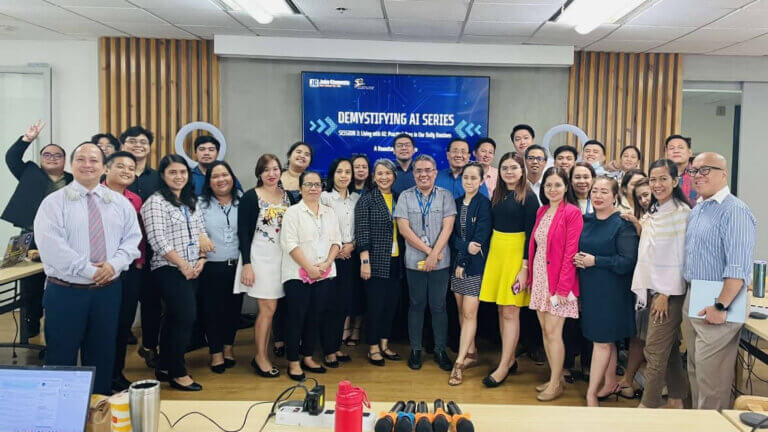Artificial Intelligence (AI) has rapidly integrated into our daily lives, reshaping how we work, learn, and interact. To explore the multifaceted impact of AI, John Clements Consultants recently hosted a three-part training series titled “Demystifying AI.” This series aimed to discuss AI’s transformative potential and practical applications in various sectors.
Session 1: Insights from Harvard Business School
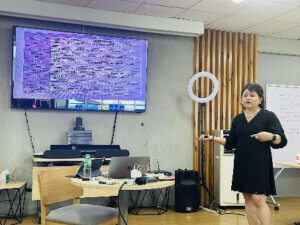
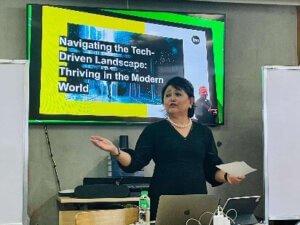
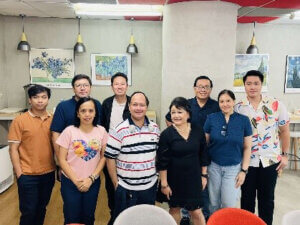
The first session was moderated by Maria Carolina Dominguez, President & CEO of John Clements Consultants. Drawing from her experiences at Harvard Business School’s program “Leading with AI: Exploring Business and Technology Frontiers,” Carol provided a comprehensive overview of AI’s role in modern business environments. She emphasized how AI is revolutionizing work processes, enhancing productivity, and prompting a re-evaluation of traditional organizational structures.
Carol highlighted AI’s pervasive influence across multiple sectors, including finance, healthcare, and education. In finance, AI-driven algorithms optimize trading strategies, detect fraud, and provide personalized financial advice. In healthcare, AI aids in the early detection of diseases, personalizes treatment plans, and streamlines administrative tasks. The education sector is transforming through AI-powered personalized learning experiences, automated grading systems, and enhanced administrative efficiencies.
Session 2: The Basics of Artificial Intelligence
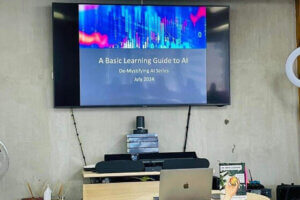
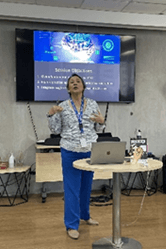
Dr. Grace Alcid, Learning & Development Director at John Clements Consultants, led the second session, focusing on the fundamentals of AI. She provided a historical overview of AI, tracing its development from early conceptual stages to its current sophisticated state. Alcid explained key concepts such as machine learning, neural networks, and natural language processing, demystifying the technical jargon often associated with AI.
One of the highlights of this session was Alcid’s discussion on the stages of AI development. She outlined the progression from narrow AI, which is designed for specific tasks, to general AI, which possesses the capability to perform any intellectual task that a human can. The potential future of AI, often referred to as superintelligent AI, was also explored, sparking a lively discussion on ethical considerations and the need for robust regulatory frameworks.
Dr. Alcid also shared excerpts from the book “Co-Intelligence” by Ethan Mollick, illustrating how AI can enhance human intelligence and collaboration. She emphasized the concept of co-intelligence, where AI systems complement human skills, leading to more informed decision-making and innovative problem-solving.
Session 3: AI in Practice
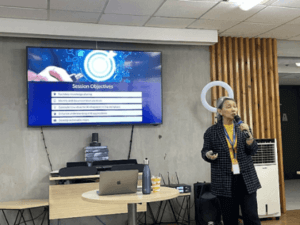
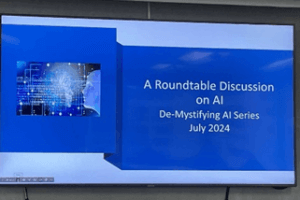
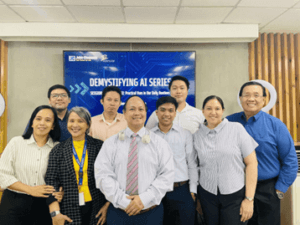
The third and final session was particularly engaging, featuring a discussion on the practical uses of AI in daily routines. Facilitated by Dr. Grace Alcid, this session delved into AI’s usefulness, the AI tools used by participants, the challenges and risks associated with AI, and the future trajectory of AI.
During the discussion, participants shared their experiences with various AI tools, such as:
- ChatGPT: An AI language model by OpenAI, used for generating human-like text based on input prompts. It helps with drafting emails, writing code, creating content, and answering queries.
- Perplexity: An AI tool designed for generating complex, creative text, often used in creative writing, content creation, and brainstorming sessions.
- Invideo AI: A video creation platform that leverages AI to simplify video editing and production, enabling users to create professional-quality videos with ease.
- Microsoft Edge: A web browser that integrates AI to enhance browsing experiences, offering features like smart search, personalized news feeds, and productivity tools.
- Bing: Microsoft’s search engine that uses AI to deliver more relevant search results, provide instant answers, and enhance image and video search capabilities.
Participants discussed the tangible benefits these tools brought to their workflows, such as increased efficiency and improved accuracy. However, the conversation also highlighted significant challenges and risks, including data privacy concerns, the potential for job displacement, and the ethical implications of AI decisions. Specific challenges mentioned included AI hallucinations (generating false or misleading information), lies, excessive dependency on AI tools, relevance and accuracy of available data, the need for sufficient internet bandwidth, and the high costs associated with paid AI subscriptions.
Envisioning the Future of AI: Insights and Implications
The discussion on the future of AI was particularly thought-provoking. Participants speculated on how AI might evolve to tackle more complex problems and the role it could play in fostering sustainable development and social good. They also stressed the importance of continuous learning and adaptability, as AI technology evolves rapidly and requires new skill sets.

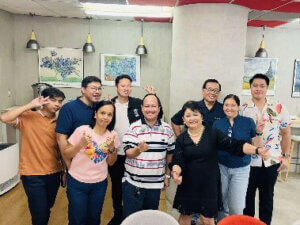
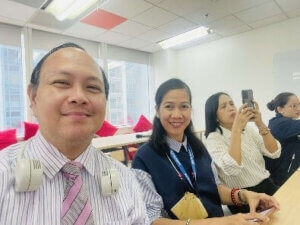
The “Demystifying AI” training series provided valuable insights into the transformative power of AI. Through engaging discussions and expert-led sessions, participants gained a deeper understanding of AI’s practical applications and its potential to reshape our daily routines. As AI continues to evolve, such training sessions are crucial for demystifying the technology and empowering individuals and organizations to harness its full potential responsibly and effectively.
Learn more about how John Clements Consultants, Inc. shapes and strengthens its workforce through a range of training programs and engagement activities.

